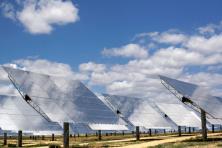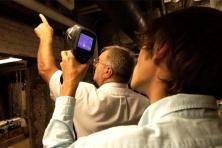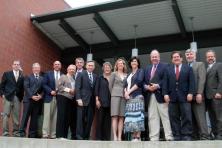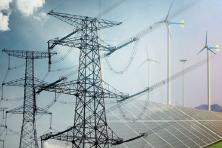Of late, a rising set of rational Republican voices can be heard affirming the assessment of 95 percent of the scientific community that the earth is warming at an alarming rate due to burning fossil fuels. None is running for office and therefore does not need to pander to the chorus of Tea Party climate deniers. What are these rational Republicans saying? That denying climate change is not in rhythm with reality and poses significant risks to our national security and our economy.
This past Sunday former South Carolina Representative Bob Inglis, who lost his primary fight partly because he acknowledged both the reality and the challenge of climate change, called fellow conservatives on the carpet in an opinion piece for Bloomberg Businessweek for “following sentiment, not science” and for failing to hew to conservatism’s traditional belief in facts and the power of markets.
“You would expect conservatives to stand with 95 percent of the scientific community,” Inglis wrote. “Normally, we deal in facts, we accept science and we counter sentiment. . . . Courage fails us when it comes to energy and climate. Fearing our economic circumstances, we’ve decided to channel the fear rather than to confront it.”
Inglis was particularly gutsy in calling out both the health impacts from coal-fired plants (23,600 premature deaths in the U.S. annually, 21,850 hospital admissions, 26,000 emergency room visits for asthma, 38,200 heart attacks that are not fatal and 3,186,000 lost work days), as well as the real costs of oil:
We pay the full cost of petroleum in hidden ways, too. We pay to protect the supply lines coming out of the Middle East through the blood of the country’s best and though the treasure that comes from our taxes or, worse, from deficit financing. We pay in the risk to our national security. We pay the cost of lung impairments when the small-particulate pollution comes from tailpipes just like we pay when the small particulates come from power plants. We just don’t pay at the pump.
What if we attached all of the costs -- especially the hidden costs -- to all fuels? What if we believed in accountability? What if we believed in the power of free markets?
Inglis’ statements echo others from within the Republican ranks. For at least six years, if not longer, former CIA director James Woolsey has been sounding the alarm about our nation’s dependence on Middle Eastern-produced oil, primarily citing the national security risk of relying on suppliers inimical to the United States, but also the global environmental risk of continuing to spew carbon into the atmosphere.
In testimony delivered on April 19, 2007 before the Senate Foreign Relations Committee, Woolsey stated: “[O]il contributes over 40 per cent of the global warming gas emissions caused by fossil fuels. . . the clear weight of scientific opinion—e.g. the views of the US National Academy of Sciences—is on the side of the proposition that global climate change is in part anthropogenic and that it is related to the release of CO2 and other gases such as methane.”
At the time, Woolsey found a more receptive audience among Republican Senators such as John McCain (AZ), Lindsey Graham (SC), Lisa Murkowski (AK), and John Warner (VA). But in the intervening years, with the rise of Tea Party activists who reject the science of human-caused global warming, all those senators except former Senator Warner (now retired and therefore not as subject to right-wing rage), have backed away from acknowledging that climate change is a real and immediate danger requiring immediate redress. As a senior advisor to the Pew Project on National Security, Energy, and Climate Change, Warner is crisscrossing the nation trying to persuade Republicans to stop succumbing to fossil-fuel-funded climate denial efforts.
Last fall, former Secretary of State George Schultz contributed significantly to the effort to defeat Proposition 23, which would have decimated California’s clean energy laws. Secretary Schultz did not mince words when describing the measure’s proponents: “Those who wish to repeal our state’s clean energy laws through postponement to some fictitious future are running up the white flag of surrender to a polluted environment.”
Now we are seeing climate change starting to bubble up in the early primary states. According to National Journal, conservative economist Douglas Holtz-Eakin, who advised McCain’s 2008 presidential run, is working in tandem with New Hampshire-based Clean Air-Cool Planet to speak to New Hampshire voters in advance of the 2012 presidential primary about both the economic dangers and opportunities that climate change presents.
Holtz-Eakin also brought his message to our neck of the woods in the Northwest in June of this year, participating in a panel in Bozeman, MT moderated by Wegger Christian Strommen, the Norwegian ambassador to the United States, to discuss research on climate change and ways to address carbon emissions.
"It's a terrible injustice to the business community" that the United States hasn't passed either a carbon tax or cap-and-trade program, since it creates energy uncertainty, Holtz-Eakin told the crowd. "Utilities don't know what to invest in."
Two weeks ago, Senator Lamar Alexander (TN) resigned from his top leadership slot to work on bipartisanship in the US Senate and today in an interview with Grist Lamar said he is spending 40-50 percent of his time working on the “intersection between environment and energy.”
“We are a big, hungry, power-consuming country. We use a quarter of all the electricity in the world. In order to keep our standard of living, we need a reliable supply of cheap energy, and it needs to be as clean as possible,” Lamar told Grist’s Amanda Little.
At Climate Solutions, we have worked for 13 years with both sides of the aisle to demonstrate that we can wean our nation off of fossil fuels and benefit economically by embracing clean energy solutions. Having to debate the reality of climate change is dangerously irresponsible when the science is so clear and the need to act is so urgent. We should be devoting our efforts to the research, development, and deployment of the myriad clean energy solutions that several European Union countries and China are advancing.
Let us hope that these senior statesmen in the Republican Party can successfully persuade their fellow party members to stop wasting time debating the science and get serious about a bipartisan clean energy strategy. We need people of all political persuasions putting their shoulders to the wheel to change the way our country produces and uses.



